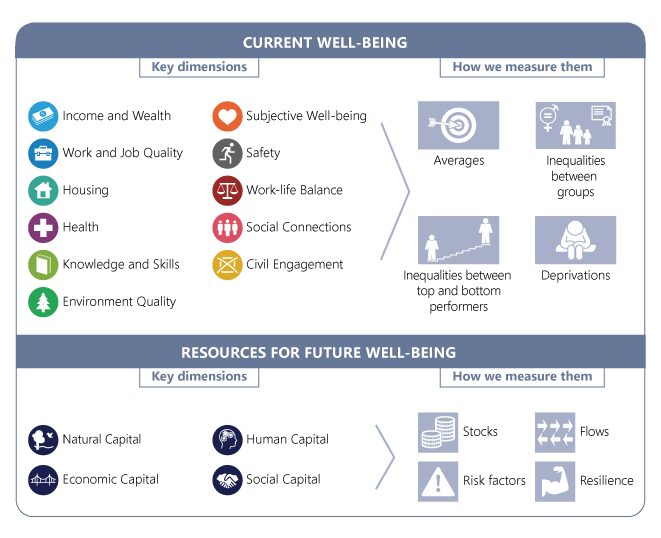The Patient Continues to Progress Well
In recent years, concerns have emerged regarding the fact that macro-economic statistics, such as GDP, don't provide a sufficiently detailed picture of the living conditions that ordinary people experience. While these concerns were already evident during the years of strong growth and good economic performance that characterised the early part of the decade, the financial and economic crisis has further amplified them. Addressing these perceptions is of crucial importance for the credibility and accountability of public policies but also for the very functioning of democracy.
Societal progress is about improvements in the well-being of people and households. Assessing such progress requires looking not only at the functioning of the economic system but also at the diverse experiences and living conditions of people. The OECD Framework for Measuring Well-Being and Progress shown below is based on the recommendations made in 2009 by the Commission on the Measurement of Economic Performance and Social Progress to which the OECD contributed significantly. It also reflects earlier OECD work and various national initiatives in the field. This Framework is built around three distinct components: current well-being, inequalities in well-being outcomes, and resources for future well-being.
OECD well-being framework

Research and on-going work
Measuring well-being and progress is a key priority that the OECD is pursuing as part of the Better Life Initiative through various streams of research and on-going work described below.
Providing analysis
For well-being measures to start making a real difference to people's lives, they have to be explicitly brought into the policy-making process.Bridging the gap between well-being metrics and policy intervention is a challenge. Building on the OECD Framework for Measuring Well-Being and Progress, the OECD is advancing this agenda through various analytical work including:
- The Short and Winding Road to 2030: Measuring Distance to the SDG Targets
- COVID-19 and Well-being: Life in the Pandemic
- Well-being and mental health - Towards an integrated policy approach
- How's Life? 2020 - Measuring Well-being
- How's Life in the Digital Age?
- Measuring Distance to the SDG Targets
- Countries' Experiences with Well-being and Happiness Metrics
- Measuring and Assessing Well-being in Israel
- How's Life in Your Region? - Measuring Regional and Local Well-being for Policy Making
- How's Life in the Province of Córdoba, Argentina?
- Measuring Well-being in Mexican States
- Well-being in Danish Cities
- Use of the well-being framework in the Multi-dimensional Country Reviews
- A well-being chapter in the OECD Economic Survey of Austria
- A well-being chapter in the OECD Economic Survey of the United States
- A well-being chapter in the OECD Economic Survey of Mexico
- Inclusive Growth
Developing better metrics
The measuring well-being agenda calls for new and improved statistical measures, aimed at filling the gap between standard macroeconomic statistics that sometimes are used as proxies of people's welfare and indicators that have a more direct bearing on people's life.The OECD has and continues to develop a number of guidelines and frameworks to support those interested in developing better well-being metrics and is advancing the measurement agenda through various work shown below.
- Guidelines on Measuring the Quality of the Working Environment
- Guidelines on Measuring Trust
- Guidelines on Measuring Subjective Well-being
- Guidelines for Micro Statistics on Household Wealth
- Framework for Statistics on the Distribution of Household Income, Consumption and Wealth
- Measuring business impacts on people's well-being and sustainability
- Quality of jobs
- Gender Equality
- Framework for measuring well-being in Latin America and the Caribbean
The OECD is also launching new projects to measure different aspects of well-being where available data are of low quality. These projects include:
Measuring trust
- González, S. and C. Smith (2017), "The accuracy of measures of institutional trust in household surveys: Evidence from the oecd trust database", OECD Statistics Working Papers, No. 2017/11, OECD Publishing, Paris
Measuring health inequalities
- Murtin, F., et al. (2017), "Inequalities in longevity by education in OECD countries: Insights from new OECD estimates", OECD Statistics Working Papers, No. 2017/02, OECD Publishing, Paris
For more information on our ongoing work, please contact wellbeing@oecd.org.
How's Life in your country?
Our How's Life? country notes show how people's well-being evolved before, during, and beyond the first year of the COVID-19 pandemic. Looking at current well-being outcomes, inequalities, and resources for future well-being, learn whether life is getting better for people in your country.
- Australia
- Austria
- Belgium
- Brazil
- Canada
- Chile
- Colombia
- Costa Rica
- Czech Republic
- Denmark
- Estonia
- Finland
- France
- Germany
- Greece
- Hungary
- Iceland
- Ireland
- Israel
- Italy
- Japan
- Korea
- Latvia
- Lithuania
- Luxembourg
- Mexico
- Netherlands
- New Zealand
- Norway
- Poland
- Portugal
- Slovak Republic
- Slovenia
- South Africa
- Spain
- Sweden
- Switzerland
- Türkiye
- United Kingdom
- United States
These country notes are updated on a regular basis based on the How's Life? Well-being database. Our most recent update of the country profiles was in March 2022.
Further reading
Working Papers and Policy Papers on Well-being and Inequalities
This series features working papers on the measurement agenda for well-being, inclusion, sustainability and equal opportunity as well as policy papers seeking to deepen the understanding of the drivers of these issues, the ways in which they interact and how they evolve.
- Papers on well-being and inequalities
- Archive of working papers on measuring well-being and progress
Related work
- How Was Life? Volume II - New Perspectives on Well-being and Global Inequality since 1820
- Framework and proposed indicators of the Joint UNECE/Eurostat/OECD Task Force on Measuring Sustainable Development
- Commission on the Measurement of Economic Performance and Social Progress
- European Commission Communication "GDP and beyond: Measuring progress in a changing world"
Back to the Better Life Initiative
Source: https://www.oecd.org/wise/measuring-well-being-and-progress.htm
0 Response to "The Patient Continues to Progress Well"
Post a Comment